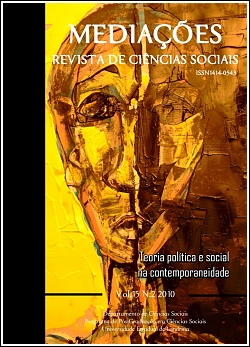Introduction to a critique of modernity as a sociological concept
DOI:
https://doi.org/10.5433/2176-6665.2010v15n2p28Keywords:
Modernity, Conceptual history, Sociology, Temporality, Max Weber.Abstract
This article borrows the methodological framework from the conceptual history, as well as some of the substantive findings from the principal essay of conceptual history on the concept of modernity by Hans Ulrich Gumbrecht, to criticize the present-day use of the concept of modernity by sociology, paying special attention to the sociology produced in Brazil. I demonstrate that two fundamental meanings historically associated with the concept of modernity are also present in the sociological material although in a rather non-reflexive manner. They are: modern as something opposed to traditional within a scheme of linear temporal evolution and modernity as a transitional period as opposed to that which is eternal and immutable. The lack of critical reflexivity on the concept combined with the plethora of meanings attributed to it lead to a situation entirely opposed to what one would expect from an analytical concept. Instead of clarity, we have confusion and the implicit importation and universalization of major ethnocentric European narratives, which sociology uses as a sort of measurement to evaluate non-European societies.Downloads
References
BÔER, Pim den. Civilisation (beschaving). Amsterdam: Amsterdam University Press, 2001.
BRUNNER, Otto; CONZE, Werner; KOSELLECK, Reinhart. Geschichtliche grundbegriffe: historisches lexikon zur politisch-sozialen sprache in Deutschland. Stuttgart: Klett, 1972.
CARDOSO, Fernando Henrique; FALETTO, Enzo. Dependencia y desarrollo en américa latina; ensayo de interpretación sociológica. México: Siglo Veintiuno, 1969.
Deutschunterricht, Stuttgart, v. 23, n. 6, p. 58-67, 1971.
FERES JÚNIOR, João. A história do conceito de latin america nos Estados Unidos. Bauru, São Paulo: Edusc, 2005.
FERNANDES, Florestan. A Integração do Negro na Sociedade de Classes. São Paulo: Dominus, 1965.
FRANK, Andre Gunder. Capitalism and underdevelopment in latin america: historical studies of Chile and Brazil. New York: Monthly Review Press, 1967.
FUKUYAMA, Francis. The end of history and the last man. New York: Avon Books, 1992.
GUMBRECHT, Hans Ulrich. Making Sense in Life and Literature, Theory and History of Literature. Minneapolis: University of Minnesota Press, 1992.
GUMBRECHT, Hans Ulrich. Modern, modernität, moderne. In: BRUNER, Otto; CONZE, Werner; KOSELLEK, Reinhart. Geschichtliche grundbegriffe: historisches lexikon zur politisch-sozialen sprache in Deutschland, v. 4, Stuttgart: KlettCotta, 1978. p. 93-131.
HEGEL, Georg Wilhelm Friedrich. The philosophy of history. New York: Willey, 1944.
HEGEL, Georg Wilhelm Friedrich; MILLER, Arnold V.; FINDLAY, J. N. Phenomenology of spirit. Oxford: Oxford University Press, 1977.
JAUSS, Hans Robert. Antiqui/Moderni (Querelle Des Anciens Et Des Modernes). In: RITTER, J.; GRÜNDER, K (ed.). Historisches Wörterbuch Der Philosophie, Basel: Schwabe. v. 1, 1971. p. 410-414.
JAUSS, Hans Robert. Literarische tradition und gegenwärtiges bewußtsein der modernität. wortgeschichtliche betrachtungen. In: STEFFEN, Hans. Aspekte der modernität, Göttingen: Vandenhoeck & Ruprecht, 1965. p. 150-197.
KOSELLECK, Reinhart. Futures past: on the semantics of historical time. Cambridge: The Mit Press. 1985.
LEHMANN, Hartmut; RICHTER, Melvin (ed.). The meaning of historical terms and concepts: new studies on begriffgeschichte. Washington: German Historical Institute, 1996. Occasional Paper, v. 15.
LÖWITH, Karl. Meaning in history. Chicago: The University Of Chicago Press, 1949.
MARTINI, Fritz. Modern, die moderne. In: MERKER, P.; STAMMLER, W.; KOHLSCHMIDT, W. Reallexikon der deutschen literaturgeschichte. Berlin: De Gruyter. 1965.
MARX, Karl; AVINERI, Shlomo. Karl Marx on colonialism and modernization; his despatches [sic] and other writings on China, India, Mexico, the middle east and north Africa. Garden City, N.Y.: Doubleday, 1968.
MARX, Karl; ENGELS, Friedrich; BEER, Samuel Hutchison. The communist manifesto. Arlington Heights: H. Davidson, 1987.
MARX, Karl; ENGELS, Friedrich; LENIN, Vladimir Ilyich; CZOBEL, E. Critique of the gotha programme. New York: International Publishers, 1970.
MARX, Karl; O’MALLEY, Joseph J. Critique of Hegel’s ‘philosophy of right’. Cambridge: University Press, 1970.
MARX, Karl; SITTON, John F. Marx today : selected works and recent debates. New York: Palgrave Macmillan, 2010.
PALONEN, Kari. Das Webersche moment: zur kontingenz des politischen. Opladen: Westdeutscher Verlag, 1998.
PALONEN, Kari. Max Weber’s reconceptualization of freedom. Political Theory, Beverly Hills, v. 27, n. 4, p. 523-544, 1999.
PALONEN, Kari. Societies: evolutionary and comparative perspectives. Englewood Cliffs: Prentice-Hall, 1966.
PALONEN, Kari. Was Max Weber a ‘nationalist’: a study in the rhetoric of conceptual change. Max Weber Studies, London, v. 1, n. 2, p. 196-213, 2001.
PARSONS, Talcott. The Social System. New York: Free Press, 1964.
SCHNEIDER, Jost. Ein beitrag zu dem problem der ‘modernität’. Der
TAYLOR, Charles. Sources of the self: the making of the modern identity. Cambridge: Harvard University Press, 1989.
WEBER, Max. Economy and Society; an Outline of Interpretive Sociology. New York,: Bedminster Press, 1968.
WEBER, Max; PARSONS, Talcott; TAWNEY, R. H. The protestant ethic and the spirit of capitalism. New York: Scribner’s, 1950.
Downloads
Published
How to Cite
Issue
Section
License
Copyright on articles published in Mediações belongs to the author(s): in the case of partial or entire republication of the original publication, we ask author(s) to indicate the original publication in the periodical.
Mediações uses the Creative Commons Attribution 4.0 International license, which allows Open Access, enabling any user to read, download, copy and disseminate its content so long as adequately referenced.
The opinions expressed by the author(s) are their sole responsibility.
































